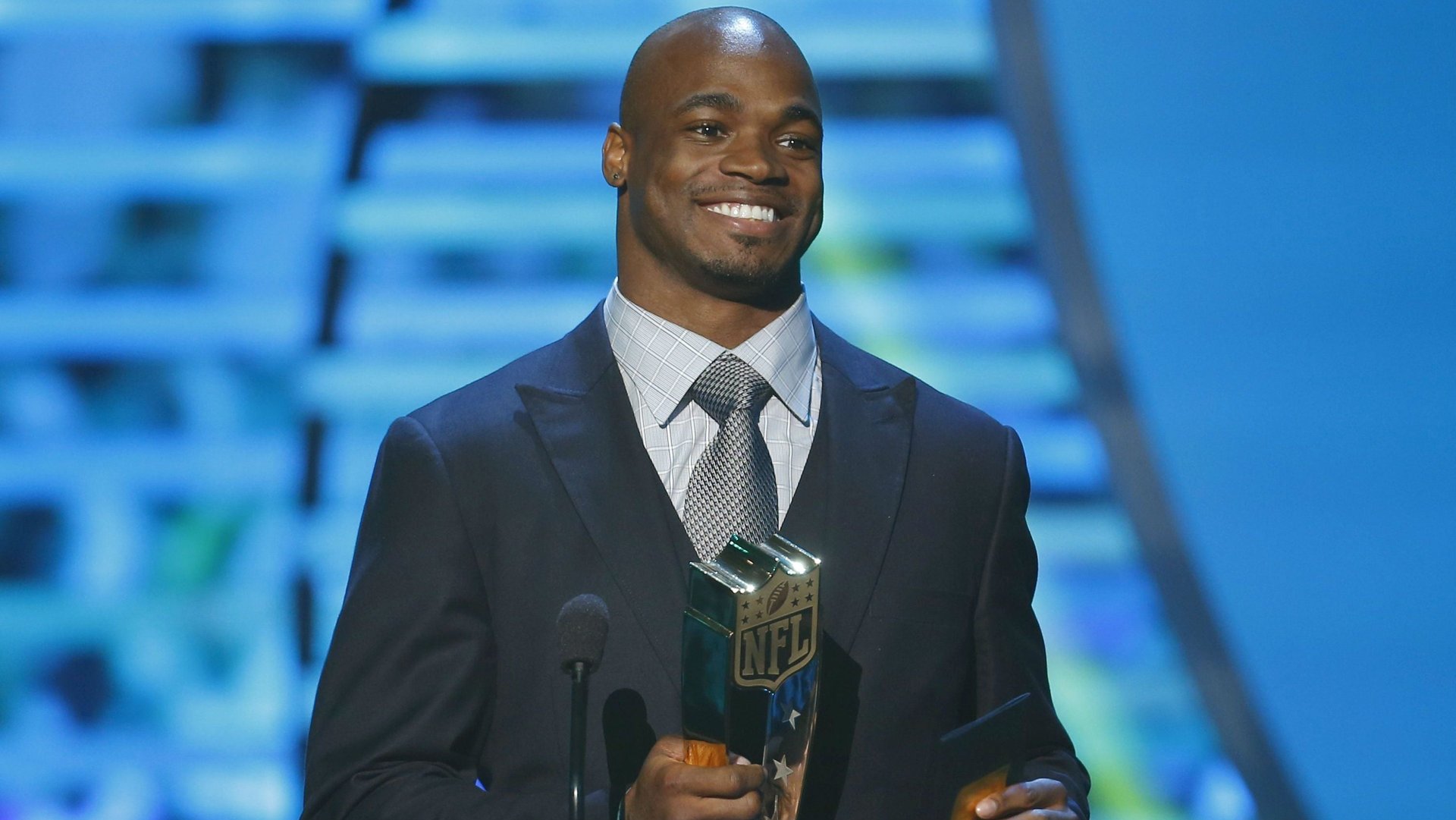It’s time we reject the idea that beating our kids is part of black culture
The news of NFL player Adrian Peterson’s arrest for child abuse came on the heels of a week focused on an act of domestic violence from another black football player. Some of his colleagues rushed to defend Peterson and suggest his charges were yet another example of our society’s widespread and unfair demonization of black men. “[Peterson] can’t play Sunday for disciplining his child[.] Jesus help us” tweeted fellow NFL player Roddy White. And running back Mark Ingram chimed in, arguing that his parents gave him “more whoopins” than he can count because “they just wanted [him] to be the best human possible”.


The news of NFL player Adrian Peterson’s arrest for child abuse came on the heels of a week focused on an act of domestic violence from another black football player. Some of his colleagues rushed to defend Peterson and suggest his charges were yet another example of our society’s widespread and unfair demonization of black men. “[Peterson] can’t play Sunday for disciplining his child[.] Jesus help us” tweeted fellow NFL player Roddy White. And running back Mark Ingram chimed in, arguing that his parents gave him “more whoopins” than he can count because “they just wanted [him] to be the best human possible”.
To be sure, the prevalent use of corporal punishment among African-Americans is no secret. Some scholars have argued that beating children in the black community serves as some sort of traumatic reenactment of the brutal violence experienced during slavery, a remnant of centuries-old barbarity.
But let’s be clear. Black people are not the only ones who use corporal punishment when it comes to disciplining their children. About 80% of white and Hispanic parents admit that they spank their kids, too. Lots of Christians defend it as a religious practice and in 19 states it’s still legal for teachers and staff to punish children with spankings at school.
So, when a black man gets arrested for an act that is still ambivalently upheld by our country’s legal and moral codes, more than a few hackles are raised about the role race might be playing.
For some folks, the very act of questioning black parenting triggers concerns about racism. And for good reason. The absolute devastation of the black family during slavery shaped the very definition of freedom around the ability to raise one’s own children. But even after slavery ended, black parents continued to experience extensive governmental surveillance, critique, and intervention in their homes. Even today, a black woman is much more likely (than a white woman under the same conditions) to be investigated for child abuse and have her children removed. And her children are likely to stay in foster care for much longer.
Criticism of black fathers is an even touchier subject. Whether it’s the rhetoric of our own black-father-in-chief President Obama, infamous government studies about the failures of black mothers, or general commentary in the mainstream press, it seems like everyone thinks that fatherhood is the cure to all that ails black Americans. These folks argue that without men, children lack discipline, stability, and proper guidance. And, historically, many black men challenging racial constraints were taken from their homes through acts of white terrorism and murder. As a result, attacks on black fathers is not only seen as attack on black families, but also an assault on black progress. This is even more true when it comes to criticizing a professional athlete like Adrian Peterson, who so clearly embodies our ideals of black masculinity, strength, and success.
As the comments of some of Peterson’s fellow players show, there are even those in the black community who make a larger cultural argument that the strict punishment of black children is a necessary evil. Physical discipline at the hands of a loved one is seen as preferable to the always-looming life-and-death threat of white supremacist violence. Renisha McBride, Trayvon Martin, Mike Brown, Donald Maiden, Jr., Darius Simmons, and others function as cautionary tales for many black parents, reminding them that being a Black child in America is a dangerous enterprise. The severity of their beatings warns black children that they can’t afford to mess up. And the anger, fury, and pain of heavy hands convey their parents’ profound fear.
But these are all hollow excuses and cultural pretense when it comes to discussing what happened to a little boy at Adrian Peterson’s hands a few months ago. The truth of the matter is that Adrian Peterson beat his 4-year-old son so badly that he had bruises on his scrotum. His son reported that before Peterson struck him repeatedly with a stick, he stuffed his mouth with leaves and pulled down his pants. This was how Adrian Peterson aimed to teach his son how to share. But in truth, it was a lesson in patriarchy—that a man’s power comes from the control and degradation of weaker others.
Over 1,500 children died from abuse and neglect in 2012 alone, most of them younger than four. So, all of those folks upholding Peterson as a symbol of black male oppression or denigration need to take a step back. The bruises on that little boy’s body are not symbolic. His fear and trauma are not due to some grand media conspiracy. And hiding and rationalizing violence against weak and helpless people represents the very worst of humankind. The black community is more than black men; violence is not love. And if you think the media coverage of men like Ray Rice or Adrian Peterson make black people look bad, then just think what it looks like when you defend and justify their abuse.